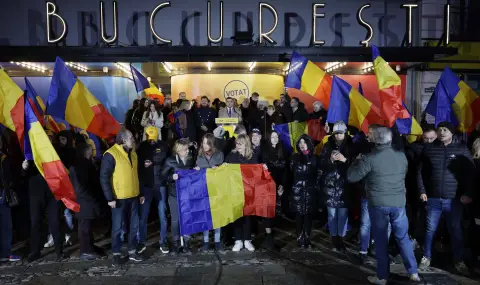These days, Romania, as has often happened in its post-communist history, is teetering between tragedy and grotesque. It is both tragic and grotesque that a decade of stalled reforms in the country and a deep distrust of the political class have helped right-wing, pro-Russian charlatans win the election. It is equally tragic and grotesque that the traditional political elite does not seem to want to learn any serious lessons from the situation.
Following the parliamentary elections of December 1 and the presidential elections that were canceled two weeks ago, negotiations are currently underway in Bucharest for a government within the framework of a large “pro-European coalition" by all democratic parties. However, it seems that this is more about positioning and power games than about the essential reforms that Romania needs. It is not known when there will be new presidential elections, and the results of the first round of the presidential elections on November 24 should also be analyzed.
The TikTok candidate
Completely surprisingly, the most votes went to Calin Georgescu, almost unknown to the Romanian public - a non-partisan right-wing extremist with Orthodox-fundamentalist, pro-Russian and esoteric views. He condemns everything “Western” as harmful, glorifies the Romanian fascists from the times between the two world wars and advocated until the first round for Romania to leave the EU and NATO. Because of Georgescu's activity on TikTok, he is called the "TikTok candidate".
The Constitutional Court first ruled that the presidential elections were legal, then surprisingly annulled them two days before the second round, which was supposed to be held on December 8, 2024. The reasons - information from leaked secret documents. According to them, Georgescu received significant financial and logistical support from a Romanian IT specialist to better position himself on TikTok. In addition, Russia (which is not named by name - it is called a "state actor") probably helped him with his appearance on social media, and also carried out hacker attacks against the IT infrastructure of the Romanian electoral commission.
Weak evidence, unprofessional work
However, the disclosed evidence is not solid. In addition, reading the documents gives the impression that the Romanian secret services work poorly and unprofessionally. Their completely opaque work has been a problem for decades.
Georgescu is currently being prosecuted by the Romanian special prosecutor's office DIICOT, which is responsible for combating particularly serious political corruption and organized crime. The investigations also concern illegal financing of an election campaign. The EU is also planning, at Romania's request, an investigation and a case against TikTok for electoral influence.
The Constitutional Court is not independent
Despite all this, the Romanian public is deeply divided on the issue of the annulment of the elections. Both many citizens and political parties perceive it as a violation of the democratic will of the voters. The Constitutional Court is definitely not an institution with a good reputation in Romania - it is considered politically dependent and obedient, as well as insufficiently competent.
For example, in October, the far-right presidential candidate Diana Sosoaca was excluded from the elections, but other right-wing extremists remained. It is an open secret in Bucharest that the strongest ruling party, the Social Democrats, wanted to prepare a convenient scenario for the presidential elections in this way: the current Prime Minister Marcel Ciolacu would be the favorite for the run-off, and the rather hopeless Gheorghe Simion, leader of the far-right Alliance for the Unity of Romanians, would face him.
They don't want reformist parties in the coalition?
Currently, the ruling political elite is making efforts for normality. In the parliamentary elections on December 1, pro-European parties won a nominal majority: the social democrats, the national liberals, the progressive-liberal alliance "Save Romania" and the national conservative minority party of the Hungarians. But three right-wing extremist parties represent more than a third of the votes in both chambers of parliament, the strongest among them being the Alliance for the Unification of Romanians.
All democratic parties plus the 19 mandatory deputies from national minorities agreed after the elections on a “pro-European coalition”, excluding cooperation with right-wing extremists. But the progressive-liberal alliance “Save Romania” does not seem very welcome in the coalition - and it is currently the only serious reformist party in Romania. The alliance's request for a budget to finance the reform program has so far been ignored.
The party's leader Elena Lasconi criticized the proposed reform program, calling it a new edition of previous promises that were never fulfilled. “Save Romania” may even abandon the coalition - the union does not want to play the role of a fig leaf, as its representatives say.
„The Romanian Prigozhin"
The grotesque and the tragic are intertwined in another episode - the alleged coup in the country. It was planned by a group around the former Romanian mercenary and fighter of the „Foreign Legion" Horatiu Potra, also known as the „Romanian Prigozhin". Potra has long been a commander of mercenaries in the Congo, where he is believed to have committed serious war crimes. He is considered a supporter of the far-right presidential candidate Calin Georgescu.
On December 8, 2024, the day after the presidential election was annulled, Potra and several other men were arrested while traveling to Bucharest in trucks loaded with weapons, military equipment and large sums of cash. Authorities initially spoke of a "planned coup", but in the meantime it is said only that Potra wanted to stage riots. He was arrested after an anonymous phone call. But it remains a mystery why the secret services and other authorities did not take any action against the long-known and apparently less conspiratorial Potra. And now he is free again.
Author: Keno Ferzek
